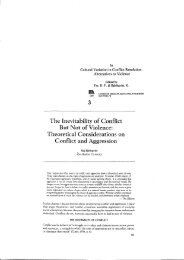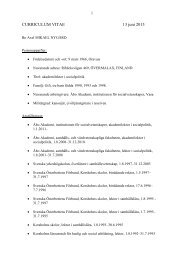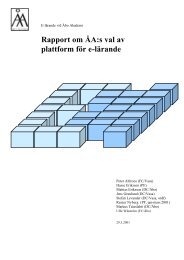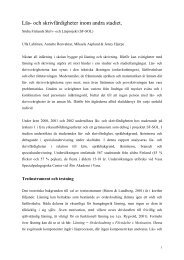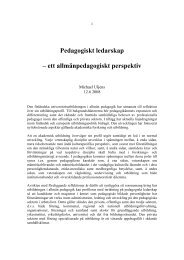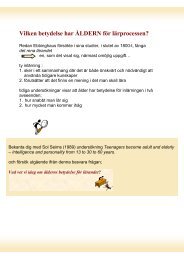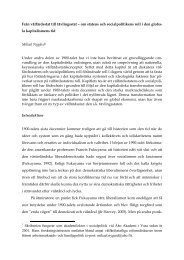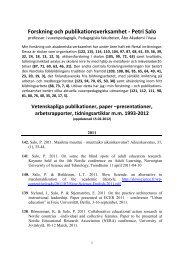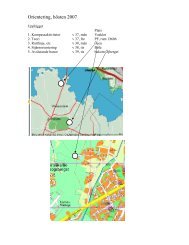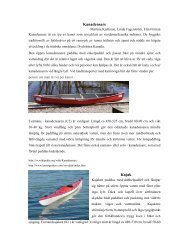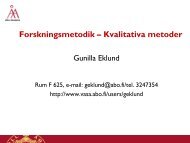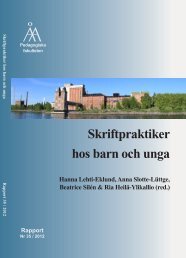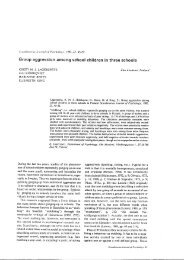Parties, Candidates and Citizens On-Line - Åbo Akademi
Parties, Candidates and Citizens On-Line - Åbo Akademi
Parties, Candidates and Citizens On-Line - Åbo Akademi
Create successful ePaper yourself
Turn your PDF publications into a flip-book with our unique Google optimized e-Paper software.
Str<strong>and</strong>berg 2005). These articles addressed the research questions of what the Finnish online<br />
citizens are doing <strong>and</strong> what impact on-line politics has on them. The articles have<br />
dealt with these questions by focusing on two types of on-line activity by the citizens. As<br />
such, these articles shed complementary light on each other. The second article assessed<br />
both the use of the internet as a source for election information <strong>and</strong> as a basis for the<br />
citizens’ voting decision. That is, how the internet is serving to reduce the barriers for<br />
retrieving political information <strong>and</strong> what impact this has on the citizens’ voting decisions<br />
(cf. Downs 1957). The fifth article addresses Finnish citizens’ engagement in political<br />
discussions on-line <strong>and</strong> how this is serving to activate the citizens <strong>and</strong> make them more<br />
prone to express their views on public matters (cf. Norris 2001, 218). The findings of<br />
these two studies will now be summarized in turn <strong>and</strong> primarily discussed in light of the<br />
mobilization <strong>and</strong> reinforcement theories.<br />
2.2.1 <strong>On</strong>-line political information <strong>and</strong> its impact on citizens’ voting decisions<br />
The Finnish citizens’ use of different types of sources for election-related information,<br />
both traditional <strong>and</strong> on-line, prior to the 2004 election for the European Parliament were<br />
assessed in the second article of this thesis (Carlson & Str<strong>and</strong>berg 2005). The<br />
demographic characteristics of Finnish citizens with internet access who a) looked for<br />
political information on-line, b) visited party or c<strong>and</strong>idate websites <strong>and</strong> c) visited the<br />
c<strong>and</strong>idate selectors provided mainly by the news media, were also examined. The article,<br />
moreover, examined the impact the on-line sources had on the Finnish voters’ voting<br />
decisions, both in general <strong>and</strong> according to the citizens’ demographic characteristics.<br />
Therefore, in a theoretical perspective, the article shed light on both the general use <strong>and</strong><br />
importance of the internet as a source for political information, <strong>and</strong> the socio-economic<br />
patterns of this on-line political activity. These are two areas which have been perceived<br />
to be potential indications of reinforcement (cf. Norris 2001, 91-92).<br />
As for the findings of the article, it should firstly be noted that the study indicated<br />
that internet-based sources for election information still lag behind traditional sources for<br />
the Finnish population in general. Thirteen per cent of the population looked for<br />
election-related information on the web, while ten per cent visited party- or c<strong>and</strong>idate<br />
websites. Significantly higher shares of the population followed election stories on<br />
television <strong>and</strong> in the newspapers <strong>and</strong> observed election ads on television (41%, 36% <strong>and</strong><br />
61% respectively). <strong>On</strong>ly the c<strong>and</strong>idate selectors mainly provided on the websites of the<br />
news media attracted a considerable share of the citizens (24%). The internet is far from<br />
being frequently used by citizens as a source for election related-information in Finl<strong>and</strong>.<br />
Some interesting findings were, however, brought forward when taking sociodemographic<br />
characteristics into account as predictors in logistic regression analyses. The<br />
176



